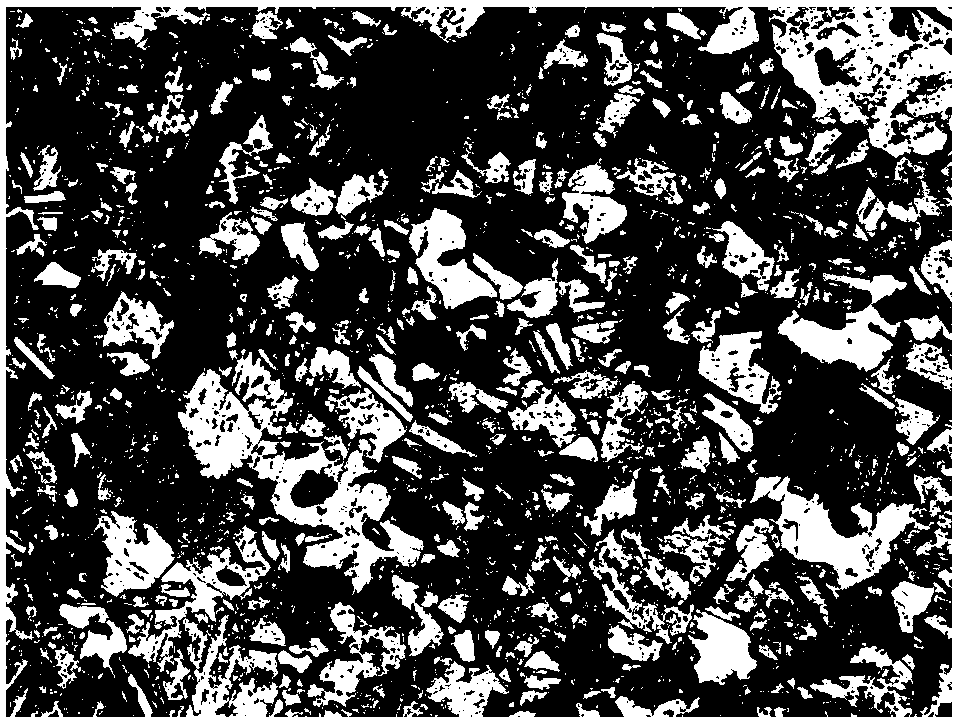A copper-carbon composite material with high hardness and high conductivity, its preparation method and application
A high-conductivity, composite material technology, applied in metal rolling, manufacturing tools, metal rolling, etc., can solve the problems of the volume fraction limitation of the reinforcement, the inability to promote large-scale application, and the reduction of copper conductivity. Low cost, increased hardness, and small reduction in electrical conductivity
- Summary
- Abstract
- Description
- Claims
- Application Information
AI Technical Summary
Problems solved by technology
Method used
Image
Examples
Embodiment 1
[0035] The grade of the copper plate in this embodiment is TU1, and the size is 100 mm in length, 10 mm in width, and 1 mm in thickness. The copper plate is heat-treated in advance at 600° C. in an argon atmosphere, and annealed after 2 hours. The completely annealed copper plate is subjected to surface treatments such as deoxidation and degreasing. Spread graphite powder on the copper plate. The volume of graphite powder accounts for 0.1% of the volume of the entire composite material (copper + graphite). The graphite powder evenly covers the upper surface of half of the copper plate. The copper plate is centered and folded to cover the graphite powder. Press the half-fold tightly, and then roll it at room temperature without lubrication. Repeat the above procedure (surface treatment on the rolled copper plate, no graphite powder added, fold in half along the rolling direction, and then roll). The purity of graphite powder is 99%, and the particle size is ~48μm. The industri...
Embodiment 2
[0042] The graphite powder is sandwiched between the pure copper copper plates that have been fully annealed, deoxidized and degreasing treated. The volume of graphite powder accounts for 0.1% of the volume of the entire composite material (copper + graphite), and then it is used with no lubrication at room temperature. In the same process as in Example 1, cumulative rolling was continuously performed 30 passes.
[0043] The grade of the copper plate in this embodiment is TU1, and the size is 100 mm in length, 10 mm in width, and 1 mm in thickness. The copper plate is heat-treated in advance at 600° C. in an argon atmosphere, and annealed after 2 hours. The completely annealed copper plate is subjected to surface treatments such as deoxidation and degreasing. The graphite powder has a purity of 99% and a particle size of about 48 μm. The industrial rolling mill is adopted, and the rolling speed is 187mm / min. During each rolling pass, the reduction in the thickness direction of ...
PUM
| Property | Measurement | Unit |
|---|---|---|
| hardness | aaaaa | aaaaa |
| hardness | aaaaa | aaaaa |
| carrier mobility | aaaaa | aaaaa |
Abstract
Description
Claims
Application Information
 Login to View More
Login to View More - R&D
- Intellectual Property
- Life Sciences
- Materials
- Tech Scout
- Unparalleled Data Quality
- Higher Quality Content
- 60% Fewer Hallucinations
Browse by: Latest US Patents, China's latest patents, Technical Efficacy Thesaurus, Application Domain, Technology Topic, Popular Technical Reports.
© 2025 PatSnap. All rights reserved.Legal|Privacy policy|Modern Slavery Act Transparency Statement|Sitemap|About US| Contact US: help@patsnap.com



